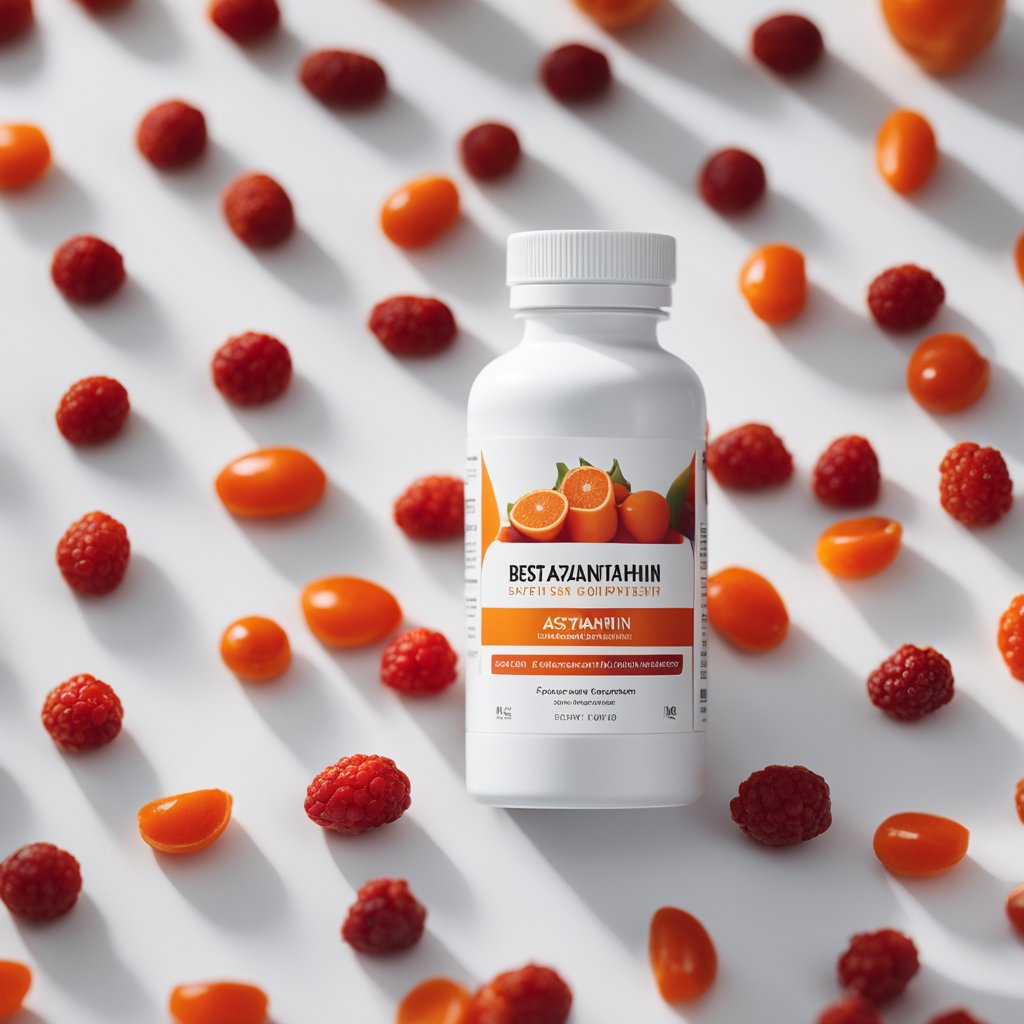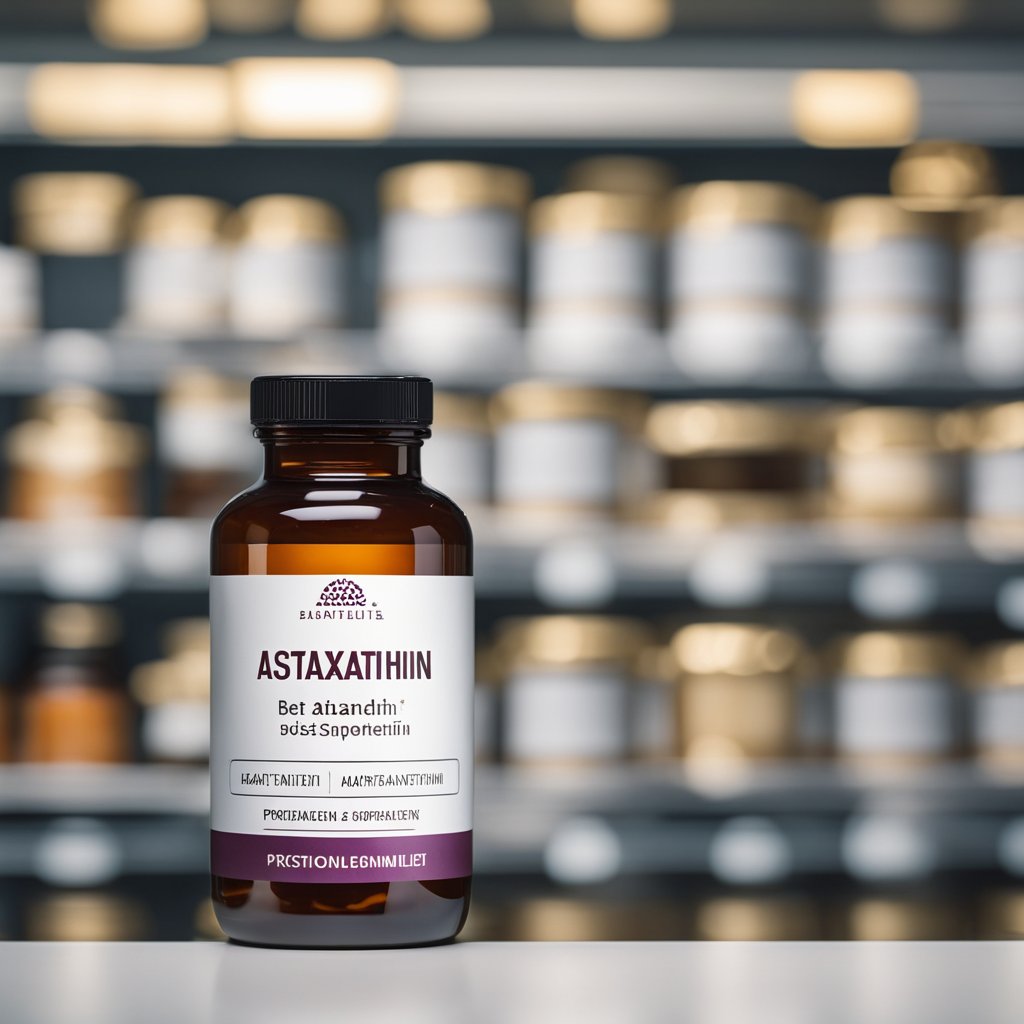Astaxanthin, a potent antioxidant found naturally in certain algae and seafood, has garnered attention for its potential health benefits. The substance is responsible for the vibrant pink and red hues observed in salmon, shrimp, and other sea life. As interest in dietary supplements continues to rise, astaxanthin stands out for its antioxidant properties which are suggested to be stronger than other carotenoids and Vitamin E.

When considering the inclusion of astaxanthin in one’s diet, the search for the best supplement becomes key. A variety of factors need to be taken into account, including the source of astaxanthin, its dosage, formulation, and the presence of additional ingredients that may enhance or detract from its efficacy. Navigating the landscape of astaxanthin supplements involves understanding labels, examining the credibility of manufacturers, and determining the most effective and safe options available based on current research.
Key Takeaways
- Astaxanthin is a strong antioxidant with potential health benefits, naturally found in certain marine life.
- Selecting the best supplement involves evaluating source, dosage, and additive ingredients.
- Research and understanding manufacturer credibility are essential in choosing an effective astaxanthin supplement.
Understanding Astaxanthin

In this section, I’ll provide insights into astaxanthin, a powerful carotenoid found in certain algae and seafood. I’ll clarify what it is and detail its natural sources.
What Is Astaxanthin?
Astaxanthin is a potent antioxidant belonging to the carotenoid family. Unlike some carotenoids, it does not convert to vitamin A in the human body, which prevents any potential toxicity from oversupply. My focus on astaxanthin stems from its significant antioxidant capabilities, which often outperform other antioxidants in combating oxidative stress.
- Chemical properties: Astaxanthin is a keto-carotenoid, known for its strong UV-light protection.
- Role in nature: In aquatic ecosystems, astaxanthin provides the characteristic red or pink color to many sea creatures such as salmon, trout, and shrimp.
Astaxanthin Sources: Algae and Seafood
Astaxanthin in nature primarily originates from microalgae, and haematococcus pluvialis microalgae are its richest natural source. When fish or seafood consume these algae, they then contain astaxanthin by extension.
- Microalgae:
- Species: Haematococcus pluvialis
- Astaxanthin concentration: Highest among natural sources
- Seafood:
- Notable examples: Salmon, trout, and krill
- Astaxanthin function: Provides vivid coloration and contributes to the antioxidant defense system of the seafood
I note that while synthetic astaxanthin exists, natural astaxanthin, especially from haematococcus pluvialis microalgae, is often preferred due to its presumed superior antioxidant properties.
Health Benefits of Astaxanthin
In my research, I’ve found that astaxanthin, a potent antioxidant, offers diverse health benefits, particularly for skin, joint, heart, and immune system health.
Skin Health and Anti-Aging
My skin is constantly exposed to environmental stressors that can lead to premature aging. I’ve learned that astaxanthin can help combat these effects. Astaxanthin:
- Reduces oxidative stress that leads to skin aging
- Helps diminish the appearance of wrinkles
- Enhances skin’s moisture levels and elasticity
Such antioxidant properties make astaxanthin beneficial for maintaining youthful skin.
Joint and Heart Health
Joint discomfort can impair my mobility. Astaxanthin benefits:
- Joint health by possibly reducing inflammation that causes discomfort from conditions like rheumatoid arthritis
- Heart health by potentially improving triglyceride levels and HDL (good cholesterol)
Maintaining cardiovascular health is crucial, and astaxanthin may contribute to the prevention of heart disease through these mechanisms.
Supporting the Immune System
A well-functioning immune system is vital for my overall health. Astaxanthin’s role in immune health includes:
- Enhancing the body’s immune response
- Potentially reducing inflammation, supporting the body in combating various diseases
By addressing inflammation and oxidative stress, astaxanthin can be pivotal in ensuring a robust immune system.
Selecting the Best Astaxanthin Supplement
When looking for the best astaxanthin supplements, it’s vital to consider quality, dosage, and additional ingredients to ensure maximum benefit and safety.
Evaluating Quality and Purity
I ensure the supplement’s quality by checking if it is sourced from natural astaxanthin, which is derived from the microalgae Haematococcus pluvialis. A higher quality often corresponds with a certification indicating the product is non-GMO and gluten-free. For purity, I seek third-party testing assurances that highlight freedom from harmful levels of contaminants. Products like BioAstin Hawaiian Astaxanthin often meet these high standards.
Key Factors to Consider for Quality and Purity:
- Source: Natural astaxanthin from Haematococcus pluvialis.
- Certifications: Look for non-GMO and gluten-free labels.
- Testing: Third-party tested for contaminants ensures purity.
Understanding Dosage and Absorption
Determining the optimal dosage is crucial, with standard doses of astaxanthin supplements ranging from 4mg to 12mg. My focus is on the bioavailability of the product, as this influences how well astaxanthin is absorbed. Softgel capsules can offer better absorption than powder forms. I would consider how components like Vitamin C and CoQ10 may impact bioavailability and efficacy.
Dosage Range and Absorption Factors:
- Dosage: Ranges between 4mg to 12mg per day.
- Form: Softgels may offer improved absorption over powders.
- Bioavailability Enhancers: Vitamin C and CoQ10.
Additional Supplement Ingredients
I assess the ingredient list to identify any additional components that may enhance the main effects of astaxanthin or cater to specific dietary needs. Ingredients should be beneficial and complementary, like the inclusion of Vitamin C for antioxidant support. A quality supplement should also be free from unnecessary preservatives, soy-free, and should list all ingredients clearly to ensure transparency and inform consumers with allergies or dietary restrictions.
Considerations for Additional Ingredients:
- Complementary Ingredients: Vitamin C for added antioxidant benefits.
- Dietary Needs: Options available that are soy-free and without preservatives.
- Label Transparency: Clear ingredient listing for informed choices.
Potential Side Effects and Interactions
As you consider taking astaxanthin supplements, it’s crucial to understand potential side effects and how it may interact with other medications to ensure safe supplementation.
Side Effects of Astaxanthin
Astaxanthin is generally considered safe when taken within the recommended dosages. However, some individuals might experience mild side effects such as:
- Gastrointestinal discomfort: This may include feelings of abdominal pain or indigestion.
- Changes in skin pigmentation: In some cases, a slight orange or pink tint can occur, mainly due to high dosages.
These side effects are typically not severe and often resolve with discontinuation or dose reduction.
Astaxanthin and Drug Interactions
My findings suggest that while astaxanthin has very few known drug interactions, caution is advised:
- Blood thinners (like Warfarin): Astaxanthin may potentially enhance the effect of blood-thinning medications, raising the risk of bleeding.
- Cytochrome P450 substrates: Astaxanthin can affect the metabolism of drugs processed by these enzymes, potentially modifying their effects.
Always consult a healthcare provider before combining astaxanthin with other medications.
Guidelines for Safe Supplementation
I recommend adhering to these guidelines to ensure safe supplementation:
- Consult your healthcare provider, especially if you are on medication, to rule out any potential interactions.
- Stick to recommended dosages as per label instructions or healthcare advice.
- Check for quality certifications from bodies like the FDA to avoid contaminated supplements with preservatives or yeast.
- Choose astaxanthin sourced from reputable brands, preferring those that provide transparency about sourcing, such as krill oil origin.
By following these guidelines, you can minimize the risk of side effects and interactions associated with astaxanthin supplementation.
Astaxanthin and Clinical Research
In examining astaxanthin supplements, it’s crucial to consider their basis in clinical research. I will focus on the scientific evidence backing astaxanthin’s potential benefits.
Scientific Studies on Astaxanthin’s Effectiveness
Clinical Evidence: My investigation into the clinical evidence points to multiple studies assessing astaxanthin’s impact on various health aspects. A critical review of randomized controlled trials reveals a trend where astaxanthin supplementation may reduce markers of oxidative damage and inflammation.
-
Physical Endurance: One study, published in a peer-reviewed journal, illustrated that daily astaxanthin intake could enhance physical endurance. Subjects displayed increased running times to exhaustion, which signals potential benefits for athletes or individuals engaged in regular physical activity.
-
Sports Research: Research specifically targeting the sports sector indicates that astaxanthin may support muscle recovery. In controlled trials, participants who received astaxanthin exhibited reduced muscle damage post-exercise, potentially leading to quicker recovery times.
-
Sunburn Prevention: An interesting angle of research evaluates astaxanthin’s role in sunburn prevention. Clinical trials have documented that subjects supplementing with astaxanthin experienced a reduced reaction to UV radiation, suggesting a protective effect against sunburn.
-
Immune Function: The potential influence of astaxanthin on immune function has also been a subject of study. Findings suggest that regular intake may confer a supportive role in enhancing the body’s immune response, though I note that further research is needed to solidify this relationship.
In summary, the clinical research paints a promising picture for astaxanthin’s role in health, with particular focus on its ability to mitigate oxidative stress, boost physical performance, aid in recovery, offer sun protection, and possibly fortify immune function. However, I remark that continued studies are essential to fully understand the extent and mechanisms of these effects.
Frequently Asked Questions
I’ve compiled a list of common queries regarding astaxanthin supplementation, with straightforward, fact-based responses to help you make informed decisions.
What are the top benefits of taking astaxanthin supplements for skin health?
Astaxanthin, a powerful antioxidant, supports skin health by protecting against UV-induced damage and reducing inflammation. Studies suggest it can improve skin elasticity, moisture, and texture.
How do I choose a high-quality natural astaxanthin supplement?
Seek supplements with astaxanthin sourced from microalgae and verify purity by checking for certifications such as Non-GMO or GMP (Good Manufacturing Practices). Transparent labeling of astaxanthin content per serving is also essential.
What are the distinguishing features of the most trusted astaxanthin brands?
Respected brands typically have a history of third-party testing for quality and safety, as well as a solid reputation for sourcing ingredients sustainably. Customer reviews and scientific backing for their products are also indicative of trustworthiness.
In what forms is astaxanthin available as a supplement, and which is the most effective?
Astaxanthin supplements are available in softgels, capsules, and liquid form. While effectiveness can be consistent across forms, softgels might offer better absorption due to oil-based delivery.
Can daily consumption of astaxanthin have any adverse effects?
Astaxanthin is generally recognized as safe, but high doses may cause pigmentation changes or hormonal effects. It’s advised to consult with a healthcare professional, especially if you have existing health conditions or are on medication.
What is the recommended dosage for astaxanthin supplements to achieve optimal results?
The dosage can vary widely depending on the desired benefit but typically ranges from 4 to 12 mg per day. Always start with the lower dosage recommended by the manufacturer or your healthcare provider.